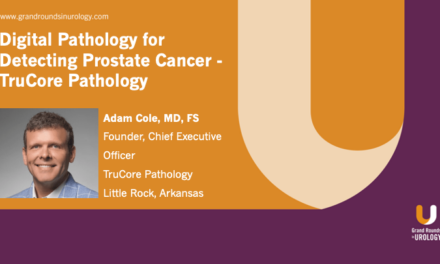Franklin Gaylis, MD, presented “Leveraging the EMR to Improve Quality in Clinical Practice” for the Grand Rounds in Urology audience in June 2021.
How to cite: Gaylis, Franklin. “Leveraging the EMR to Improve Quality in Clinical Practice” June 2021. Accessed Dec 2025. https://grandroundsinurology.com/leveraging-the-emr-to-improve-quality-in-clinical-practice/
Leveraging the EMR to Improve Quality in Clinical Practice – Summary:
In part 2 of a 3-part series, Franklin Gaylis, MD, FACS, Chief Scientific Officer of Genesis Healthcare Partners and Voluntary Professor of Urology at the University of California, San Diego, shows how quality reporting improves adherence to best practices in use of active surveillance for low-risk prostate cancer. He explains that while guidelines have indicated for a number of years that active surveillance is often the best treatment for low-risk prostate cancer, data from quality reporting show that relatively few doctors were following this guidance a decade ago. Extracting these data based on the AUA’s Centers for Medicare & Medicaid Services (CMS) approved quality measures is difficult, requiring a manual process which is time-consuming and expensive. Active surveillance adherence provides a good case study for why having this data is important though, as Dr. Gaylis demonstrates by reviewing the results of a study he and his team began conducting in 2011. At the start of the study, audited physician feedback showed that adoption of active surveillance for low-risk prostate cancer was only about 32%, far lower than guidelines recommend. With the adoption of reporting standards, the next year saw an improvement to 39% adoption. By 2014, once doctors could see others’ data, adoption increased to 58%. This increase in adherence to guidelines has continued through 2018. Dr. Gaylis concludes that quality reporting will continue to increase in importance and that audited physician feedback improves adherence to quality measures.
Parts 3 of Dr. Gaylis’ look at how the EMR template can improve outcomes in urology will be published on GRU next week. Part 1 can be viewed here.
Disclosure: Dr. Gaylis has an ownership stake in GenIT LLC, which owns WizMD, a software program created at Genesis Healthcare Partners that is used for data extraction. It currently has no significant value.
ABOUT THE AUTHOR
Franklin D. Gaylis, MD, FACS, is a Co-Founder and the Medical Director of Genesis Healthcare Partners in San Diego, California. Dr. Gaylis also serves as the Executive Medical Director for Unio Health Partners and holds a voluntary position as Professor of Urology at the University of California, San Diego. Dr. Gaylis specializes in prostate cancer and developing clinical tools aimed at improving outcomes following radical prostatectomy.





